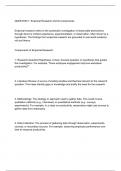QUESTION 1: Empirical Research and Its Components
Empirical research refers to the systematic investigation of observable phenomena
through direct or indirect experience, experimentation, or observation, often driven by a
hypothesis. The findings from empirical research are grounded in real-world evidence,
not just theory.
Components of Empirical Research:
1. Research Question/Hypothesis: A clear, focused question or hypothesis that guides
the investigation. For example, "Does employee engagement improve workplace
productivity?"
2. Literature Review: A survey of existing studies and theories relevant to the research
question. This helps identify gaps in knowledge and justify the need for the research.
3. Methodology: The strategy or approach used to gather data. This could involve
qualitative methods (e.g., interviews) or quantitative methods (e.g., surveys,
experiments). For example, in a study on productivity, researchers might use surveys to
gather data from employees.
4. Data Collection: The process of gathering data through observation, experiments,
surveys, or secondary sources. For example, observing employee performance over
time to measure productivity.




